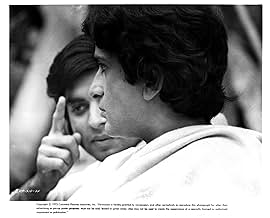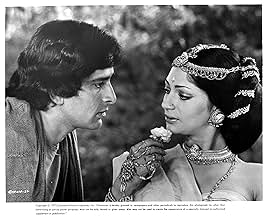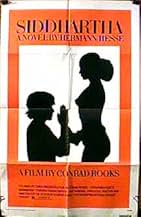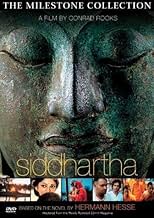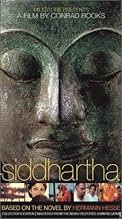NOTE IMDb
6,6/10
1,3 k
MA NOTE
Ajouter une intrigue dans votre langueThe story of a young Indian who embarks upon a journey to find the meaning of existence. Based on the novel by Hermann Hesse.The story of a young Indian who embarks upon a journey to find the meaning of existence. Based on the novel by Hermann Hesse.The story of a young Indian who embarks upon a journey to find the meaning of existence. Based on the novel by Hermann Hesse.
- Réalisation
- Scénario
- Casting principal
Avis à la une
This film is stunning in its beauty. The music is transcendent. For the longest time I tried to get the soundtrack. To save you the trouble, be aware that they never made one! There is one scene in which a woman blows on a shell that was so powerful I still remember 30 years later. Mesmerizing. If you have not seen it yet, rent it today.
What a movie!! What a hidden gem! Can't thank a friend (VNR) enough for recommending this film. Its the ultimate soul-searching movie. "Stop searching, stop worrying, give love! Live in present. Everything changes, everything returns"! Some deep Indian philosophy in the film, presented by non-Indians primarily! I find that amazing. The music of the film by Hemant Kumar works beautifully. Very simple, melodic, mostly Bengali. Haunting. Gels so well with the river, nature depicted in the film. "O re nadi" is my favorite. The entire film has a feel reminiscent of Satyajit Ray's film making. Brilliant production. Watch this film. It will stay with you for long. Maybe a lifetime.
This is much smoother but less interesting than Conrad Rooks' other earlier and more cultish film, his drug autobiography `Chappaqua' (1966), which has cameos by Allen Ginzburg, William Burroughs, and jazzman Ornette Coleman in it. The trouble is `Siddhartha,' beautiful as it is, is a simplification of a simplification, and a spiritual quest isn't something you necessarily understand better through lush visuals, though unquestionably some of Sven Nykvist's watery landscapes with trees are unforgettable, the color is deep and rich, the music is pleasing, and the principals are awfully good looking people. Not surprisingly the high point cinematically is the sequence showing erotic encounters between the handsome lapsed sadhu, Siddhartha (Shashi Kapoor), and the lovely courtesan, Kamala. Simi Garewal, who plays Kamala, is a gorgeous creature whose lovely eyes, long aristocratic nose, and pouty lips remind one of the all-time arch teaser and sexy sophisticate of English films, Joan Greenwood. But Ms. Greenwood never was got up in the kind of exquisite gilded see-through gear Simi wears in her scenes with Shashi Kapoor. She's something to look at.
When his buddy Govinda decides earlier to follow the Buddha, Siddhartha leaves Govinda bereft by deciding to go off on his own lone search, without a guru. It seems that the point is you must pursue your quest on your own. But Siddhartha's splitting with Govinda seems somewhat meaningless since at the end of the movie, Siddhartha has joined up with the peaceful boatman he met years earlier toward the end of his sadhu period, and he winds up spouting the boatman's words of wisdom: live in the present, stop seeking, don't worry, be happy, and watch the river. The Buddha apparently hasn't helped Govinda all that much either, since he meets Siddhartha again and also needs to be taught the boatman's simple doctrines. One can't help thinking they'd both have done better staying with the Buddha, who did, after all, found one of the world's great religions.
It's rather amusing that during the two men's youthful sadhu period, when they're on the road with a group of penniless holy men, `meditation' is represented as singing rhythmically and passing a bong. My picture of this activity was different, but `Chappaqua' shows how obsessed with and involved in drugs Conrad Rooks was.
This is a lovely, but empty and ultimately not very cinematic film. Sven Nykvist's photography is at the service of a vision so generalized (Siddhartha is a universal type, not an individual), that too often the images look like something out of `National Geographic' with mise-en-scène by Bollywood. The scenes are not as exotic as those Pasolini created for his `Arabian Nights' (1974), nor are Rooks' depictions of Indian rural life ever remotely as real as Satyajit Ray's in the `Apu Trilogy.' For a trippier film version of Hermann Hesse, see Fred Haines' `Steppenwolf,' which came two years after `Siddhartha,' in 1974. For a more original film depiction of a spiritual quest, see the story of G.I. Gurdjieff as done by Peter Brooks in `Meetings with Remarkable men' (1979).
When his buddy Govinda decides earlier to follow the Buddha, Siddhartha leaves Govinda bereft by deciding to go off on his own lone search, without a guru. It seems that the point is you must pursue your quest on your own. But Siddhartha's splitting with Govinda seems somewhat meaningless since at the end of the movie, Siddhartha has joined up with the peaceful boatman he met years earlier toward the end of his sadhu period, and he winds up spouting the boatman's words of wisdom: live in the present, stop seeking, don't worry, be happy, and watch the river. The Buddha apparently hasn't helped Govinda all that much either, since he meets Siddhartha again and also needs to be taught the boatman's simple doctrines. One can't help thinking they'd both have done better staying with the Buddha, who did, after all, found one of the world's great religions.
It's rather amusing that during the two men's youthful sadhu period, when they're on the road with a group of penniless holy men, `meditation' is represented as singing rhythmically and passing a bong. My picture of this activity was different, but `Chappaqua' shows how obsessed with and involved in drugs Conrad Rooks was.
This is a lovely, but empty and ultimately not very cinematic film. Sven Nykvist's photography is at the service of a vision so generalized (Siddhartha is a universal type, not an individual), that too often the images look like something out of `National Geographic' with mise-en-scène by Bollywood. The scenes are not as exotic as those Pasolini created for his `Arabian Nights' (1974), nor are Rooks' depictions of Indian rural life ever remotely as real as Satyajit Ray's in the `Apu Trilogy.' For a trippier film version of Hermann Hesse, see Fred Haines' `Steppenwolf,' which came two years after `Siddhartha,' in 1974. For a more original film depiction of a spiritual quest, see the story of G.I. Gurdjieff as done by Peter Brooks in `Meetings with Remarkable men' (1979).
10movinut
I saw the movie twice, the first time in Sweden in 1974; I had read Herman Hesse's book before that, and the story had strongly impressed me. The movie was even better then the book! the photography was very poetic, the music (indian flutes, tablas) was very high in the aesthetics band, and the story conformed more or less with the book, but without taking away any of it's impact. there were 12 people in the theatre, and at the end as the credits were scrolling for what seemed at least 20 minutes, no-one moved from their seats as transfixed by what they had just seen. I am sure that all 12 of those people recall to this day the effect that this film created on them. I am not a Buddhist or even very religious, but i personally recommend it as part of a person's education in life....
10pinoj18
I saw the movie Siddhartha some time ago because when I first saw the title, I recognized it as a philosophical work from my college days when I study Hesse's work from my philosophy class.
It is a great film: I enjoyed it as much as I enjoyed the book by Hermann Hesse. As a philosophy major, the philosophical underlinings in the movie are most appropriate. It is by all accounts, a true Hesse's commentary on the meaning of life and man's condition on earth.
I especially liked the music although the lyrics were foreign to me. I wish I could get a translation of the songs that made the film even more enjoyable.
A great philosophical work of art.
It is a great film: I enjoyed it as much as I enjoyed the book by Hermann Hesse. As a philosophy major, the philosophical underlinings in the movie are most appropriate. It is by all accounts, a true Hesse's commentary on the meaning of life and man's condition on earth.
I especially liked the music although the lyrics were foreign to me. I wish I could get a translation of the songs that made the film even more enjoyable.
A great philosophical work of art.
Le saviez-vous
- AnecdotesSimi Garewal took the boldest step in her career by going topless for a scene in this film. It was the first topless scene in the history of Bollywood and created a massive uproar. When the scene was featured on the cover of two English magazines, it created more controversy and ended up in court. The film eventually got banned in India. When asked about it years later, Garewal, who said she was never shy, revealed that she would have stripped totally naked if they had let her. In fact, she had been totally nude in front of the filming crew for Mera Naam Joker the same year, but they only showed her from the back onscreen. She said she loved the freedom of losing her inhibitions and her clothes.
- Citations
Siddhartha: I have come to say, that you are all the things that will outlive me, that you, Kamala, will be all the beauty that will be in the shadow we leave. You will be my first love, my only love.
- ConnexionsReferenced in Génération pub: Melissa and Men (1991)
- Bandes originalesMother's Song
by Shanti Hiranand
Meilleurs choix
Connectez-vous pour évaluer et suivre la liste de favoris afin de recevoir des recommandations personnalisées
- How long is Siddhartha?Alimenté par Alexa
Détails
- Date de sortie
- Pays d’origine
- Sites officiels
- Langue
- Aussi connu sous le nom de
- На пути к истине
- Lieux de tournage
- Société de production
- Voir plus de crédits d'entreprise sur IMDbPro
- Durée1 heure 29 minutes
- Mixage
- Rapport de forme
- 2.35 : 1
Contribuer à cette page
Suggérer une modification ou ajouter du contenu manquant

Lacune principale
By what name was Siddhartha (1972) officially released in Canada in English?
Répondre


